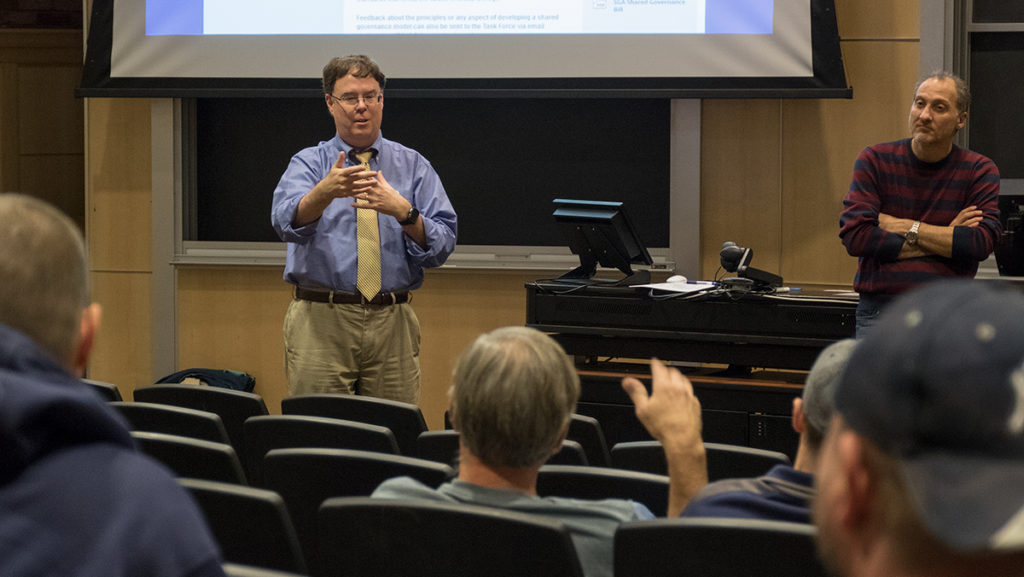After the Ithaca College Shared Governance Task Force released an updated shared governance proposal March 22 based on feedback from the campus community, criticisms remain about the power the Ithaca College Board of Trustees and the President’s Council still have in the draft — a consistent concern since the beginning of the process.
The proposal made small clarifications from the original but made no significant changes to the shared governance structure itself, attracting the criticism of faculty. The drafts proposed the creation of the College Governance Council, made up of faculty, staff, students, the provost and the vice president of finance and administration. The original draft required any proposal made by the Faculty Council, Staff Council, Administrative Council, or Student Governance Council to be approved by the CGC. In the new draft, only proposals that would affect multiple constituency groups would have to go through the CGC. However, neither the original proposal nor the updated draft states that proposals from the President’s Council or the board of trustees would have to be approved by the CGC. This was and still is the main source of criticism of the proposal, especially among faculty.
Jason Freitag, associate professor in the Department of History and Faculty Council member, said he was frustrated that this draft did not address concerns that the President’s Council was not involved enough in the shared governance process.
“The draft leaves the president and the president’s council off in a kind of space on their own,” Freitag said. “So they get to approve or deny things that come up from below, but [the draft] made no attempt to bring them into the loop of sharing what they were thinking of, so therefore, it didn’t actually change anything about the nature of governance on campus.”
Claire Gleitman, professor in the Department of English, said she had similar concerns.
“As far as I can tell, it does not place the highest level of administrative decision-making in conversation with other constituencies,” Gleitman said. “It doesn’t put those other constituencies at the table where ultimate decisions are made.”
Junior Michele Hau, member of the Shared Governance Task Force, said the concern that the President’s Council and the board of trustees would still be making top-down decisions even with the creation of the CGC has been discussed by the task force. However, she said that because the president and the board of trustees have to make substantial decisions that have the power to affect the long-term health of the college, the task force felt it would not be wise to require these sometimes confidential or sensitive decisions to be discussed publicly among other constituent groups.
She said that while the President’s Council and the board of trustees are not required to submit their proposals through the CGC, it would still be in their best interest to do so, especially with projects that will affect many people on campus, to see how it would be received.
Hau said the task force also does not have the legal power to take away decision-making power from the President’s Council or the board of trustees. The Ithaca College Policy Manual states that the president’s duties, without limitation, include institutional, faculty and educational leadership and decision-making.
David Prunty, executive director of auxiliary services and task force member, echoed Hau and said the task force was limited in what it could change regarding the President’s Council due to this policy.
“I believe our interpretation is that we can’t lessen the power of the trustees or the administration, who the trustees delegate that power to,” Prunty said.
Freitag said he does not think the power of the President’s Council would be affected in order for them to be more involved in shared governance, like submitting its proposals through the CGC.
“To say that those groups need reach out to the stakeholders affected does nothing to change the ultimate power they have to make a decision, but it involves them in an earlier process of policy-making and sharing with the campus,” he said.
Prunty said the updated draft was based on feedback from the entire campus. He said the critique that the President’s Council needed to be more involved in the CGC proposal process was not expressed by everyone, despite many faculty members expressing this concern as reported by The Ithacan.
“There was a lot of feedback,” Prunty said. “Just because there’s certain people saying certain things doesn’t mean that’s coming from the entire campus. That feedback came from certain corners and certain groups and did not come at all from other areas.”
Members of the Faculty Council have been among the most vocal critics of the proposal, and on April 4, the council voted in favor of tabling the shared governance proposal until Shirley Collado, the incoming ninth president of the college, comes into office on July 1.
Gleitman said she wholeheartedly agrees with the Faculty Council’s resolution.
“It seems appropriate to delay making major changes to our governance structure until the new president is in place and can play a key role in conversations about how to move forward,” Gleitman said.
However, junior Marieme Foote, president of the SGC and member of the Shared Governance Task Force, said she disagrees with the Faculty Council’s decision.
“We didn’t want the president super involved in this process,” she said. “We wanted it to come from the bottom up, from the constituencies on campus.”
She said the task force would be very open to receiving feedback from Collado once she begins her term but that they do not want her to be an integral piece of the process.
Prunty said the current proposal is only the second draft and that the final proposal will be submitted to the board of trustees at its meeting in May. He said the task force is currently getting a second round of feedback from the campus community and would not rule out more changes to the proposal.








